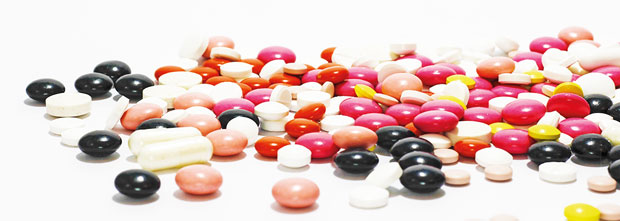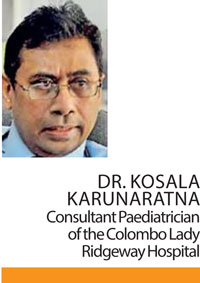06 Oct 2017 - {{hitsCtrl.values.hits}}

 For a diet to be a balanced one, it should contain all essential nutrients in the right proportions. These nutrients include carbohydrates, proteins, fats, minerals, vitamins, fibres and also water. Vitamins are only needed in small amounts but if a vitamin deficiency occurs, the consequences become a large threat to health. So it is vital that the importance of vitamins is understood. Addressing this matter, Dr. Kosala Karunaratna, Consultant Paediatrician of the Colombo Lady Ridgeway Hospital, shed light on the importance of vitamins.
For a diet to be a balanced one, it should contain all essential nutrients in the right proportions. These nutrients include carbohydrates, proteins, fats, minerals, vitamins, fibres and also water. Vitamins are only needed in small amounts but if a vitamin deficiency occurs, the consequences become a large threat to health. So it is vital that the importance of vitamins is understood. Addressing this matter, Dr. Kosala Karunaratna, Consultant Paediatrician of the Colombo Lady Ridgeway Hospital, shed light on the importance of vitamins.
What are vitamins?
“Vitamins are organic chemicals. They are essential nutrients that should be included as part of a balanced diet,” explained Dr. Karunaratna.
Types of vitamins
According to Dr. Karunaratna,vitamins are classified into two categories. They are fat soluble vitamins and water soluble vitamins.

“Fat soluble vitamins include vitamins A,D,E and K. Vitamin B complex and vitamin C fall under the category of water soluble vitamins,” he said. The B complex consists of different types of vitamin B. This includes vitamins B1,B2,B3,B5,B6,B12, folic acid and biotin. Vitamin C is also known as ascorbic acid.
Some vitamins can be synthesized by our bodies. Vitamin D is produced by the skin. Vitamin A is produced by the liver.
There are micro-organisms that inhabit the large intestine. Bacteria known as E.coli and Enterobacter aerogenes are found in the large intestines of the human body, synthesize folic acid, biotin and Vit. K.
Importance of vitamins
“Vitamins are needed for the metabolism of the body and for the maintenance of good health. Each vitamin serves an important function,”stated the paediatrician.
Functions of fat soluble vitamins
“Vit. A helps in maintaining healthy skin and helps eyesight. It is essential for growth of the body as well.Vit. D facilitates the absorption and utilisation of calcium and phosphorus contributing to healthy bones. Vit. E helps maintain healthy muscles.Vit. K. helps the clotting of blood,” explained Dr. Karunaratna.
Functions of water soluble vitamins
Vit. C helps in the synthesis of especially collagen tissue. This vitamin contributes to the healing of wounds and fighting infections. The vitamin B complex also serves in many functions. Vit.B1,B3,B5 and biotin helps in metabolic activities of the body. In addition to serving metabolic purposes, Vit. B2 helps maintain healthy skin and eyes. Folic acid aids in the formation of red blood cells. Apart from metabolism, Vit. B6 and B12 help in the synthesis of haemoglobin, antibodies and maintenance of a healthy nervous system respectively.
Vitamin deficiencies
Dr. Karunaratna explained that vitamins are required in small quantities. He warned that although they are needed in minute amounts, in case of a deficiency, it will result in specific disease symptoms.
Night-blindness is the result of Vit. A deficiency. Rickets in children and osteomalacia in adults arise due to Vit. D deficiency. Vit. E deficiency could lead to anaemia. Vit. K deficiency may cause complications of blood clotting.
Beri beri is caused by Vit. B1 deficiency whereas skin issues may arise to lack of B2 and biotin in the diet.Vit. B3 inadequacy causes pellagra. Deficiencies in Vit. B6,B12 and folic acid leads to anaemic conditions. Vit. B5 affects muscles increasing risk of cramps.
Vit. C deficiency causes scurvy.
Sources of vitamins
“Green and yellow vegetables are the best sources of Vit. A,” mentioned Dr. Karunaratna. Fish liver oils are popular sources of Vit. D. Exposure to sunlight helps formation of Vit. D by the skin. Other sources include milk, cheese and egg yolk. Vit. E sources include egg yolk, milk, butter, green vegetables and nuts. Leafy vegetables especially spinach is a good source of Vit. K.
Yeast, liver, meat, fish, egg yolk, cereal,pulses, nuts,beans and soy beans, rice polishings as well as dark green vegetables are some of the foods that supply Vit. B to the body.
“Citric fruits like oranges are well known as Vit. C sources,” said the doctor.
How common are vitamin deficiencies in Sri Lanka?
According to Dr. Karunaratna, vitamin deficiencies are quite common. “The most common deficiency is Vit. A,” he said. “Since Sri Lanka is a country that receives a lot of sunlight, Vit. D deficiencies are not so prevalent. But there are instances where absorption of Vit. D is hindered by certain foods.”
The paediatrician also stated that in the case of deficiency, vitamin supplements are prescribed. Vit. K is said to also delivered to the patient in the form of a vaccine.
Though complications are mostly due to deficiencies, an excess of vitamins, particularly fat soluble vitamins is unhealthy. When water soluble vitamins exceed the required amount, excess is passed off with urine. But in the case of fat soluble vitamins, if a person suffers from liver malfunctions, fat soluble vitamins will not be absorbed. The reason for this is the bile produced by the liver is important for the absorption. In these instances, the patient may suffer from toxicity signs.
23 Dec 2024 2 hours ago
23 Dec 2024 3 hours ago
23 Dec 2024 3 hours ago
23 Dec 2024 3 hours ago
23 Dec 2024 5 hours ago